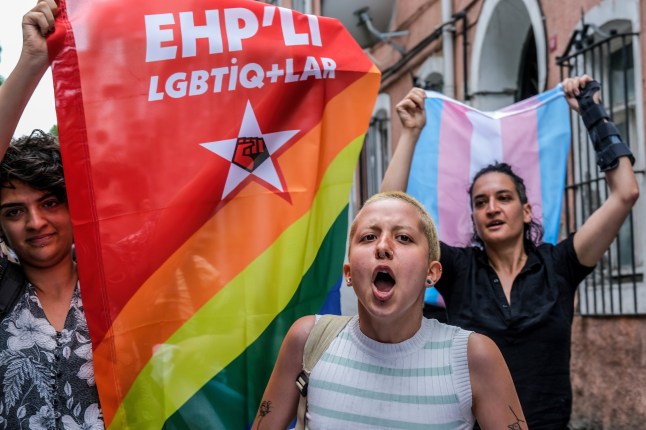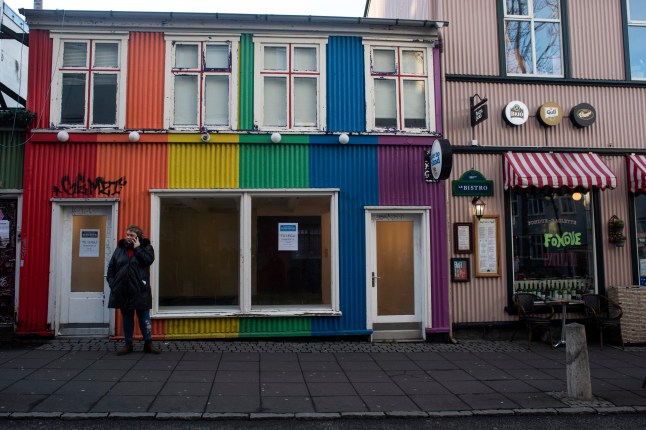
Trans rights are becoming increasingly ‘polarised’ in Europe and Central Asia, a map has shown.
Campaign group TGEU’s annual Trans Rights Map ranks the legal situation for trans people in 54 countries.
One of the best places to be openly trans in 2024 is Iceland, which scored 30 out of 32, up from 26 last year.
Russia – where among the anti-LGBTQ+ laws in the books is a ‘gay propaganda’ policy – was bottom of the pile, falling from five in 2023 to zero.
The UK, meanwhile, was rated 15.25 out of 32, up from 14.25.
Greece and Czechia saw the biggest positive change. Trans Greeks are now protected from discrimination in education, healthcare and housing, while Czechia introduced a law protecting trans asylum seekers.
Progress overall, however, has been spotty his year, TGEU said, with three times as many points removed compared to last year.
Some countries are restricting gender care for young people, such as France, where senators are calling for hormonal therapy to be banned.
Join Metro's LGBTQ+ community on WhatsApp
With thousands of members from all over the world, our vibrant LGBTQ+ WhatsApp channel is a hub for all the latest news and important issues that face the LGBTQ+ community.
Simply click on this link, select ‘Join Chat’ and you’re in! Don't forget to turn on notifications!
Others saw pro-trans policies fail to become law. In the Netherlands, an amendment that would have allowed trans people to legally change their gender without the sign-off from a medical professional was withdrawn.
Opposition MPs claimed that the amendment, which would have let trans over-16s legally change their gender, did not have enough ‘safeguards’.
Or some were scrapped altogether. Slovakia scrapped guidelines that said trans people could change their legal gender without undergoing surgery – just four doctors specialise in such treatment, according to the Slovakian information service Tranzicia.

The key takeaway is that trans rights are becoming ‘polarised’, TGEU research consultant Linn Julian Koletnik told Metro, with the full marks for Iceland and Russia’s zero capturing this.
‘The polarisation in trans rights can’t be reduced to the changes in those countries alone,’ they stressed, adding that trans rights aren’t a ‘priority’ for even progressive governments these days.
‘This leads to a polarised society, allowing anti-equality and antidemocratic tendencies to grow unchecked.
Key findings:
TGEU, a monitoring group also known as Trans Europe and Central Asia, has been creating the map every year since 2013.
Campaigners judge each country out of 32 indicators. They range from legal gender recognition and family – think a trans man being listed as ‘dad’ on his child’s birth certificate – to healthcare access.
Forty out of 54 countries in Europe and Central Asia let trans people legally change their gender. This is a right TGEU said is the ‘bare minimum’ for trans people.
Russia removed this right altogether and is now in the company of Hungary, Kyrgyzstan and Bulgaria.
A little under half of the countries have laws that protect trans people from hate crimes.
Of the 54 countries, 27 offer explicit protections for trans asylum seekers.
Ten countries ban so-called conversion therapy – a discredited practice to change a person’s sexual orientation or gender identity.
Malta and Iceland remain the only two countries in Europe and Central Asia that have ‘depathologised trans identities’ – so being trans is in no way considered a medical or behavioural disorder.
Russia’s zero ‘is actually hard to achieve’, Koletnik added, ‘as this would mean not only is there no legal gender recognition procedure in place but also no anti-discrimination legislation or policies, as well as other essential acts which protect human right’.
So while Koletnik said TGEU doesn’t expect more countries to get no points anytime soon, a 32 out of 32 doesn’t guarantee a trans person’s safety either.
Eight trans, non-binary or gender non-conforming people were murdered in Europe this year, TGEU’s ‘Trans Murder Monitoring’ project found, eight less than last year.
This decrease was ‘somewhat incoherent’ with the wider rollback of trans rights in Europe this year the map showed.
‘This just confirms what we already know and keep reiterating; everyday lived realities of trans persons don’t go hand in hand with legislation of a certain country and it is impossible to assess the safety and living conditions of trans persons based solely on legislation,’ Koletnik said.
Kristmundur Pétursson, a trans man who is the vice chair of Iceland’s national queer association, Samtökin ‘78, isn’t too surprised his home topped the list.

‘Even though it was very scary to make my way out of the closet, my trans experience now only benefits my life. I love being trans,’ Pétursson, 27, told Metro.
‘Of course, I can’t claim with full certainty what the secret ingredient to this success is but I have some ideas.’
More Trending
‘Unity’ is a big reason why Iceland has made so many gains over the last few decades, the Reykjavík local said. Iceland’s main gender law, published in 2019, was ‘largely written by trans and intersex activists’.
But this ‘unity’ also includes between campaign groups. ‘Our fight for queer rights has since the beginning been built on the local success of the feminist movement,’ Pétursson said.
‘They paved the way for us in many ways and the collaboration between these two groups over the decades has been essential in my opinion.
‘We see some neighbouring countries where this unity is lacking and the obstacles that situation creates for all parties.’
Get in touch with our news team by emailing us at webnews@metro.co.uk.
For more stories like this, check our news page.
MORE: What it’s really like to be queer in country with the biggest LGBTQ+ population
MORE: I didn’t care about Christmas until I invited a refugee home
MORE: A widow’s heartbreaking Christmas story brought tears to my eyes













